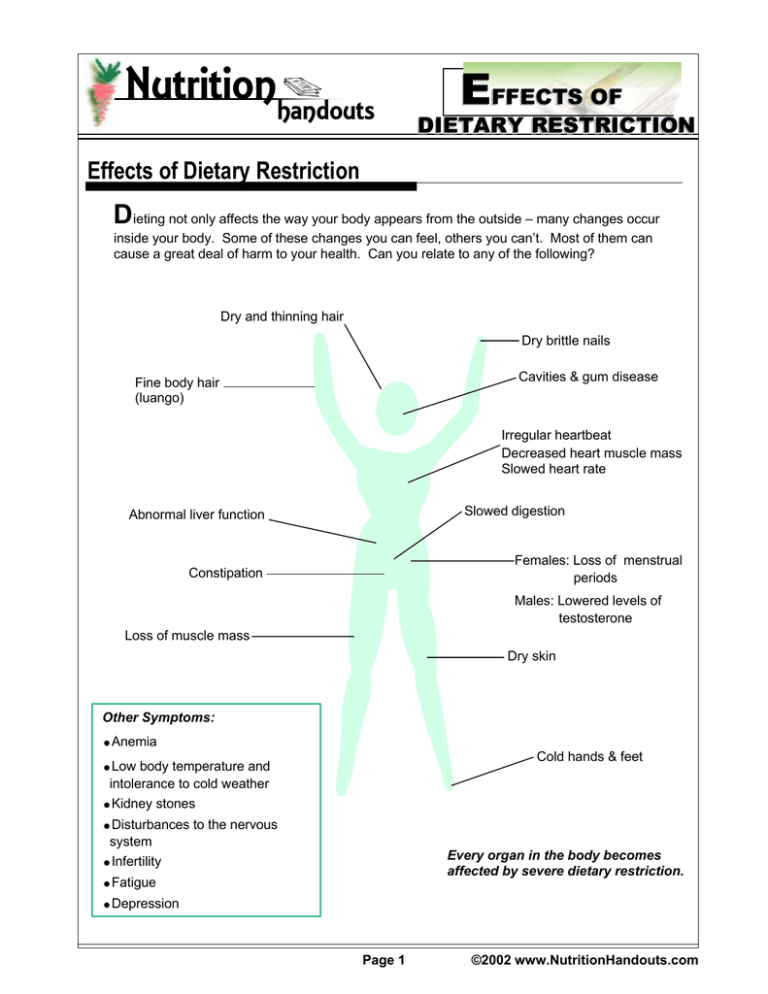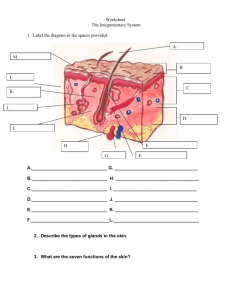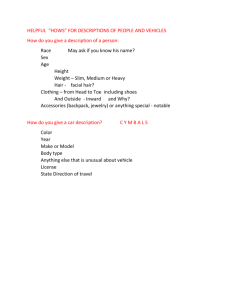Nutrition E handouts D
advertisement

Nutritionhandouts EFFECTS OF DIETARY RESTRICTION Effects of Dietary Restriction Dieting not only affects the way your body appears from the outside – many changes occur inside your body. Some of these changes you can feel, others you can’t. Most of them can cause a great deal of harm to your health. Can you relate to any of the following? Dry and thinning hair Dry brittle nails Cavities & gum disease Fine body hair (luango) Irregular heartbeat Decreased heart muscle mass Slowed heart rate Slowed digestion Abnormal liver function Females: Loss of menstrual periods Constipation Males: Lowered levels of testosterone Loss of muscle mass Dry skin Other Symptoms: Anemia Cold hands & feet Low body temperature and intolerance to cold weather Kidney stones Disturbances to the nervous system Infertility Every organ in the body becomes affected by severe dietary restriction. Fatigue Depression Page 1 ©2002 www.NutritionHandouts.com Nutritionhandouts EFFECTS OF DIETARY RESTRICTION Physical and Emotional Changes Although a person may begin to diet, or restrict their food intake to become healthier, a very unhealthy situation may result. Both body and mind are affected. BODY CHANGES Taking in too few calories and nutrients result in: Loss of muscle Loss of bone A person severely restricting calories may have a low pulse rate and low blood pressure. These are often the result of a decrease in the size of the heart muscle, not due to physical fitness. As a result of decreased food intake, the digestive process slows. Eating becomes uncomfortable because it makes the the dieter feels bloated. In addition, constipation may occur due to decreased food intake, furthering the discomfort. When a person eats too few calories, protein is not available to form hair and nails. Often people find their hair and nails dull, dry and brittle. Some experience significant hair loss. As a result of low calorie intake, the body decreases its production of certain hormones: Estrogen in females and testosterone in males are not adequately produced. Infertility may occur. Bone loss occurs in both males and females Puberty is delayed in pre-teens and teens Growth may be stunted EMOTIONAL CHANGES The brain requires fuel, just like any other organ. Many changes take place in a brain that does not receive adequate nutrition. They may result in: Mood changes Irritability, impatience Depression Hostility Obsessive thoughts about food References: 1) Becker AE, Grinspoon SK, Klibanski A et al. Eating Disorders. New Engl J Med 1999;340:1092-8. 2) Di Lima SN (ed) Dietitian’s Patient Education Manual. Gaithersburg, Md: Aspen Publishers 1996. 3) Goldbloom DS, Kennedy SH. Medical Complications of Anorexia Nervosa In Brownell KD & Fairburn CG (eds.) Eating Disorders and Obesity A Comprehensive Handbook (pp87-92). New York: The Guilford Press 1995. 4) Mahan KL, Escott-Stump S (eds). Krause’s Food, Nutrition & Diet Therapy. 10th ed. Philadelphia: WB Saunders Co. 2000. Page 2 ©2002 www.NutritionHandouts.com



